Hi, I’m Roman. I don’t know about you but I got a massive backlog of ideas for games. There are just too many. It’s overwhelming. And I’m in love with all of them!
You might have a similar issue. Doesn’t matter whether you have 200 game ideas or just two. You need to pick the one. But how to choose the right one? Let’s find out!
The Danger of Analysis Paralysis
The problem with too many options is called Analysis paralysis. The more options there are the more difficult it’s to decide. And once we choose, we’re less happy with our final choice. It’s one of many cognitive biases that affect our thinking.
That’s why copywriters and marketers offer only 3 subscription plans. That’s why you’re standing in a supermarket, juggling a bunch of peanut butter jars and wondering which one is better. Or you might recall the pain of selecting a new phone? Good luck comparing all the models and their features…
The reason why I’m bringing this is up is that I want more people to know about the topic of cognitive biases. I want you to be aware that your thinking might be compromised. That’s why I want you to study biases.

I realize it might feel a bit dry to browse through Wikipedia and read walls of text about all the different biases. I’ve provided a link anyway, just in case you’re a bookworm/wiki worm.
How about immersing yourself in a Harry Potter fan-fiction where Harry was raised by a professor instead of those damn Dursleys?! And while you read it you might learn a bit about biases and other interesting things. And Hermione? She is in Ravenclaw. Obviously! That’s what I call a proper edutainment!
Harry Potter and the Methods of Rationality is available for free as an audiobook, ebook or you can read it online.
Don’t worry I don’t expect you to read a whole book before you can pick your game ideas! I only ask you to be aware of biases and how they affect us.
If you’d like watch following TED talk on the paradox of choice by B. Schwartz that explains the analysis paralysis really well (20min):
What Makes a Good Idea?
I would say that the idea is good when it’s worth your time, effort, money or thinking.
Yes, even thinking. Consider yourself a computing resource with a limited amount of free cycles per day. Which “software” is worthy of running on your precious “hardware” (aka the brain)? What’s worth your “brain-time”?
Thinking about making an epic-scale RPG with a massive world with self-aware NPCs, complex storylines, and motion capture cinematics won’t get you anywhere because they require a massive AAA budget. Do you have a couple of spare million dollars stuffed in your mattress? Probably not. If you do, please go ahead and start making that game, thanks!
To further expand the idea of brain-time, don’t forget that our minds work on problems while we sleep or when we focus on something else. They work in the background.

Have you ever woken up with a sudden realization? That’s why sometimes it’s better to *sleep on it*.
This can work for us or against us:
- If you’re always thinking about that AAA RPG you’re going to be thinking about it even in your sleep – wasting precious brain-time.
- Or you can start occupying your mind with a better idea and let your brain do the heavy lifting in the background.
The same principle will help us decide which idea is better. Unfortunately, this means it might take at least 2 days do select the best idea. Instead of doing this in one go, I want you to take a break and sleep on it.
What’s Important to You?
How do you evaluate whether an idea for a game is actually good?
It’s really up to you the select the criteria which are important to you. I’d recommend watching Jenn Sandercock’s talk about her selection process:
One of the takeaways is that the idea should align with your personal values.
Don’t worry if you haven’t established your personal values yet. It’s not a prerequisite! However, it DOES provide a nice set of criteria to evaluate your ideas.
Just think about what’s important to you as a person. What are your needs? What do you care about? What are you thinking about most of your brain-time? What are you doing most of the time?
Someone might say (read it in a British accent): “I care about animals, I’m thinking about protecting the wildlife and I’m feeding birds during the winter.”
Someone else might say (this guy is Australian for some reason): “I care a lot about my favorite sports team. I like to party, drink and sing karaoke. I’m thinking about having [mi:] own pub.”
Whoever you are, there are things you care about. And other things? You don’t give a f*ck. Clarifying what’s really important and what isn’t will help you with the evaluation of ideas.
Game Ideas Evaluation – Step 0
Take a piece of paper, your favorite note-taking app or whiteboard and start writing down the things which are important to you. This is about all the things in your life. This isn’t about your favorite game genres or game mechanics. This is about your own personal values.
Ask yourself:
- What are your needs?
- What do you really care about?
- What are you thinking most of the time?
- What are you actually doing most of the time?
- What do you like to do?
- What do you really value in your life?
Try to identify common areas of the things you write down. For example, If you can’t live without riding a unicycle, juggling and slackline you probably hold Balance in high regard.
Need inspiration? Here are my values:
- Invigorate Health
- Learn
- Make
- Foster Relationships
- Earn Enjoyably
- Drive My Life
Invigorate Health
My health, health of people around me and the health of our little planet is important to me. That’s why I want to strengthen the health, give it a bit of vigor. A bit cheesy, I know.
Learn
I want to acquire new skills and knowledge. I want to improve the way I learn.
Make
Making stuff is something I really enjoy. I like to play around and just create something – a doodle, games, piece of text, etc.
Foster Relationships
Relationships need care. I need to devote a bit of time to reach out to others, ask them how they are or plan to meet them.
Earn Enjoyably
I want to work in a way that takes advantage of my strengths, keeps me engaged and hungry for more.
Drive My Life.
Lastly, I need to feel the progress and steer my life in a direction I want it to go.
Got it?
No? Sleep on it :]
The next step is organizing all your ideas.
Game Ideas Evaluation – Step 1
Put all your ideas into your favorite spreadsheet software. Each idea will have its own row.
Make sure to come up with a descriptive name for your ideas or add a column with a description. Make sure you know what each idea means to you.
In this phase I just want you to dump all your ideas into a single place. No judgment. Even the obviously bad ideas or too ambitious.
Put in all your ideas!
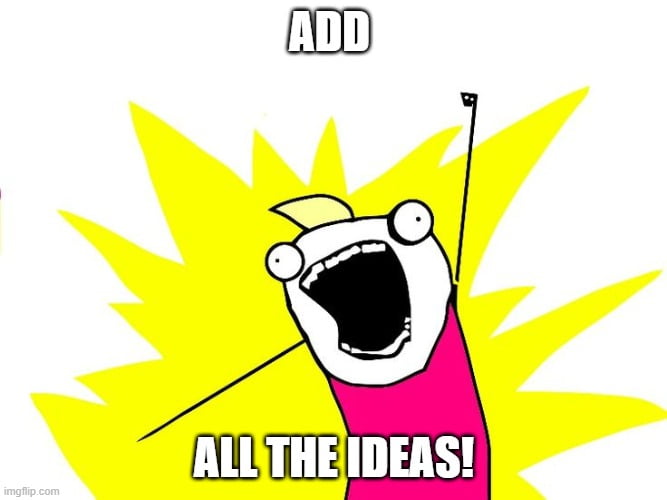
If you’re familiar with GTD, consider this your INBOX (focused specifically on game ideas).
Game Ideas Evaluation – Step 2
Start adding evaluation criteria.
Each column is another question or parameter you’ll use to evaluate your ideas. I’d start with alignment with personal values first. This game is your own (or your team’s) baby. It should somehow align with the things you care about the most.
I’ll give you an example:
One of my personal values is Make. Naturally, I’m already aligned with this value by making a game. I can go further and ask myself whether this game will also help others to make stuff. A game idea in alignment with this value would be the one with Minecraft-like gameplay or game which includes level editor or has unique characters that are cosplay-able.
If your value is Balance, you could ask yourself whether it helps you or others achieve some sort of balance.

Basically, In this step I want you to come up with a set of questions based on your personal values.
To continue the example of my personal values I can add columns with the following questions:
- Invigorate Health: Does it help me or others with health, sleep, movement or eating right?
- Make: Are people encouraged to create something in or outside of the game?
- Learn: Does it help me or others learn? “Earn Enjoyably: Would I enjoy working on this and can it earn money?
- Foster Relationships: Will I socialize with people while working on this? Or does the game help people to meet others?
- Drive My Life: Does it help me or others with personal development?
Note that later you’ll giving points to each idea on a scale on 1 to 3 for each question/criterium:
- 1 point – low score
- 2 points – medium / unknow
- 3 points – high score
No worries If you don’t have any personal values yet. Feel free to use any additional questions from my list (or come up with your own):
- Is this 3D (1), maybe (2), or just 2D (3)? (2D games are generally easier to make).
- How much game is there? How much gameplay do you see in this?
- How specific is the idea?
- 1) just a general idea about the game genre/theme/etc, needs prototyping and brainstorming
- 2) a bit of gameplay but otherwise very general, still need to nail down a big portion of the game
- 3) I have a good idea what the gameplay will be like already
- Is this streamable on Youtube, Twitch and other platforms? Can people play this in public?
- Would non-game media like local magazines, TV or radio stations be interested in covering this game?
- Are there obstacles or “landmines” preventing me from working on this idea? (1 – Many, 2 – a few, 3 – None).
- Is this a unique game? Does it differentiate from other games?
- Does it have a clear visual identity?
- Is there enough retention or replayability?
- Is this game UGC-friendly? (User Generated Content)
- If working solo – Can I make this game on my own? Do I have the expertise? Consider all the different assets (art, audio, etc). (1 – I can’t make this solo, 3 – It’s small and simple I can do it)
- How good job can I do?
- 1 bad job know only little / nothing about making it
- 2 it could be done if I learn
- 3 I think I can manage well
- Is the idea really interesting for me? (1 nah, 2 so-so, 3 it’s intriguing!)
- Will I enjoy working on it for a couple of months? (1 nope, 2 maybe, 3 yeah)
- Is it a “must-have”? Will be people be like: “I WANT TO PLAY THIS !”
- Does it have a HOOK? Something (mechanics, visual, etc) when people hear about it they would be intrigued?
- How much I wanna do it (1 not much, 2 yep, 3 yeah!)
- How much comfortable do I fell pitching it and marketing it? (1 nope, 2 yeah ok, 3 yeah!)
- How fast can I do it? Is this a game with a small scope? (1 slow/big, 2 medium-sized, 3 fast/small project)
- How much content (assets, text, etc) is needed? (1 a lot, 3 little)
- Do I practice <insert skill, knowledge, etc you want to improve> when I work on this idea?
- Does it help build my career?
- Are there any similar games on the market? How did they sell? Is this financially viable?
- Do I know how would I describe and promote the game? Do I know who would be the target audience?
- Is the game aligned with my strengths (SWOT analysis)?
After this step your spreadsheet could look something like this:

Game Ideas Evaluation – Step 3
This step is gonna be the hard one. You’re going to be evaluating your ideas. I suggest starting with the easiest question. This will help you with the analysis paralysis mentioned earlier. You will gradually eliminate unworthy ideas.
You don’t even need to ask all the questions for each idea! As soon as you start evaluating, you’ll discover ideas that aren’t worth much and we’ll get rid of them right away!
Pick a question which you find easy to answer.
Evaluate each game idea.
Remember, add 1, 2 or 3 points.
Example:
We might ask whether the idea does help me or others learn? For a Tinder-like card game about different types of cheese we can put in 3 points since players we’ll be learning about all the cheese.
Here is what we got after evaluating each idea with the easiest question:

Now, we’ll use the power of filters!
Don’t worry, it’s easy.
Here is a procedure for Google Sheets:
Select your table, select “Data” from the menu and choose “Create a filter”.
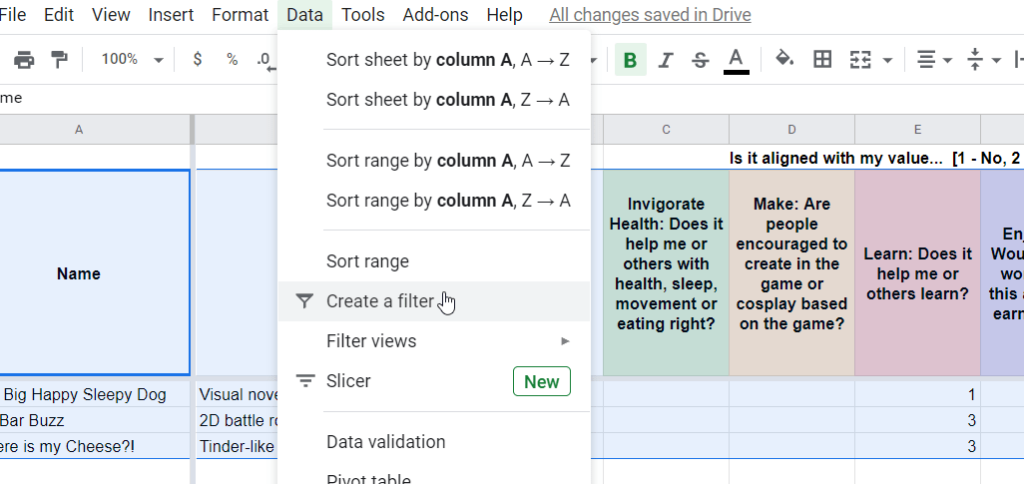
Let’s eliminate idea(s) with the lowest score.
For Google Sheets, it’s clicking on the column filter icon and unchecking value “1”:
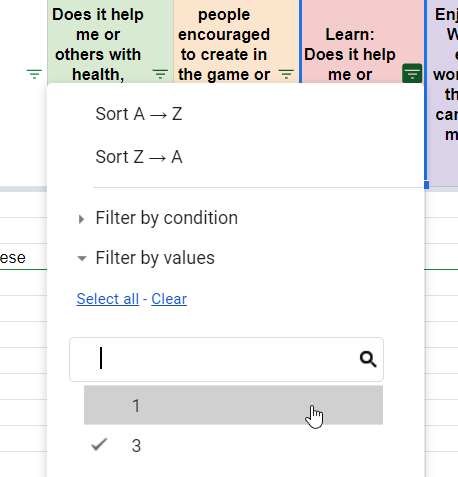
Let’s examine the table, notice there is one less idea to worry about:

There is only a pair of ideas left. Of course, this is a simplified example. Nevertheless, you don’t have to ask all the other questions for the eliminated idea.
The more questions and ideas you have, the more thankful you’re going to be for getting rid of each idea.
Let’s do the math:
In this case, we got 10 questions and 3 ideas. We got it down to just 2 ideas. We don’t have to ask 9 (remaining) questions (1×9).
That’s nice I guess?
How would this work for 210 ideas? (my case)
If the first question is able to eliminate 1 third of ideas, that saves us 70×9 questions. That’s 630 questions!
With more ideas or questions, it becomes a necessity to eliminate as fast and often as possible.
Naturally, after evaluating each consecutive question you should be able to get rid of more ideas thus further reducing the total number of questions asked.
Now I wonder whether this effect could be visualized using a chart…
Yes! Here it is:
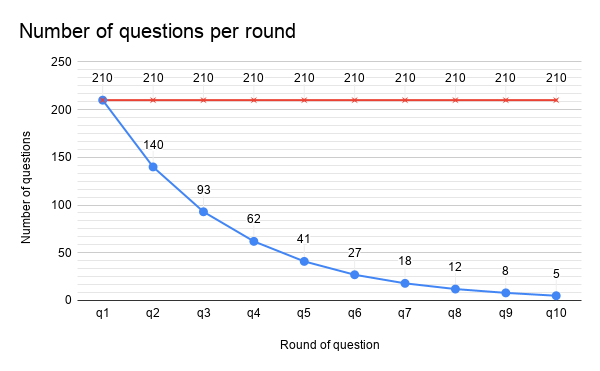
As you can see with 10 questions and 210 ideas you’ll be down to five ideas after 10 rounds of questions (assuming each question eliminates 1/3 of ideas).
And what’s the total amount of questions saved?
Without idea elimination: 210*10=2100
With elimination: 210+140+93+62+41+27+18+12+8+5=616
Questions saved: 2100-616=1484
1484 questions – that’s pretty significant.
Continue evaluating your ideas, asking questions, adding points and filtering until you get the number of ideas down to between 10 and 1.
If you’re stuck with too many ideas try consulting the Still too many.
Game Ideas Evaluation – Step 4
You’ll notice that at first, getting rid of ideas is pretty easy. However, it gets harder and harder.
Eventually, it’s gonna get difficult to evaluate and eliminate ideas just by looking at their names and a short description. You need to think deeper about each one to make them more specific, more concrete, more tangible.
In this step I want you to create a document for each remaining idea.
Add details about the game idea. This can be as simple as writing a few sentences about game mechanics or you can go big and write an entire GDD containing everything from target platforms, unique selling points, levels, story, to inspiration, list of assets needed, etc.
Personally, I’m somewhere in between. I have more details than just mechanics but I’m not following any particular GDD template.
If you want you can create Google Doc for each of your games, grab its link and create a link from the spreadsheet to the document.
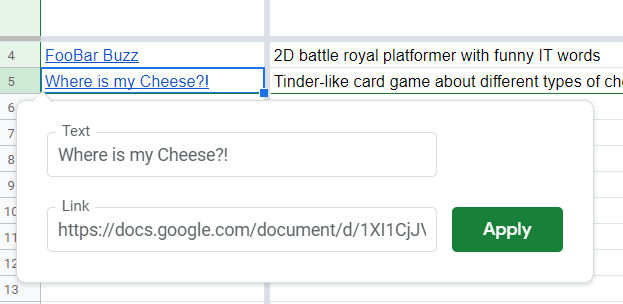
Flesh out each game idea. Brainstorm mechanics. Research similar games. Create simple prototypes.
As you dedicate time to each idea you’ll start seeing endless possibilities. You’ll also see cracks and obstacles.
Some of the ideas will grab your attention and would like to be worked on immediately. Resist the temptation. Let it settle.
Sleep on it.
Eventually, the honeymoon phase will fade and only the solid ideas will prevail.
Eliminate ideas that no longer excite you.
Still too many?
- Remove the points. Redo the questions.
- Create columns with sums, and pick ideas with the highest total score.
- Create columns with weighted sums (some questions might be more important than others).
- Sort ideas based on different columns.
- Only show ideas with 3 points.
- Write ideas on cards, turn them over, shuffle and pick one.
- Roll a dice.
- Assign a number to each idea, use random.org to generate a number. Pick the idea with the number closest to the generated number.
- Sleep on it.
- Ask your friends.
- Ask strangers.
- Ask the universe for a sign.
That should do it.
Finally, you have the idea.
Commit to it. Block out time in your calendar to work on it. Find an accountability partner or partner up with someone.
Just do it, mate. Create YOUR GAME.
Enjoy.
By the way, would you like to have a counter of ideas right in the Google Spreadsheet? Read my article: How Do I Count Visible Rows When Using Filters in Google Sheets?
Related post by Jake Birkett: http://greyaliengames.com/blog/how-to-choose-what-game-to-make-next/
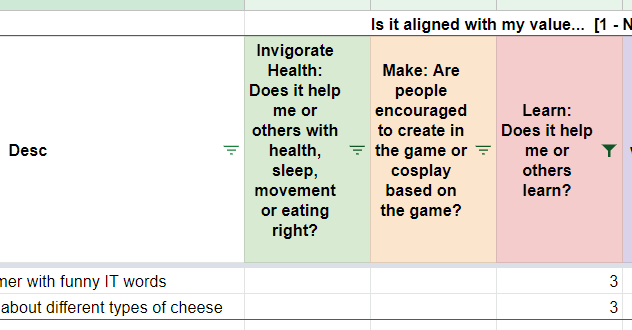
Leave a Reply